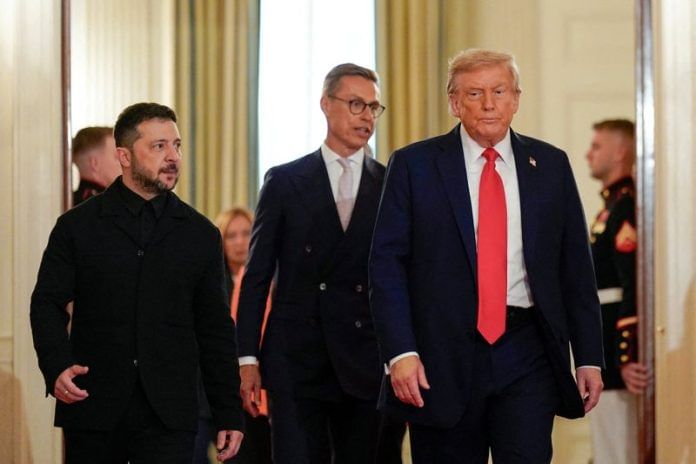By Andrea Shalal, Tom Balmforth and Anastasiia Malenko
WASHINGTON/LONDON/KYIV (Reuters) -President Donald Trump said on Tuesday he has ruled out putting U.S. troops on the ground in Ukraine, but said the United States might provide air support as part of a deal to end Russia’s war in the country.
A day after Trump pledged security guarantees to help end the war at an extraordinary White House summit, the path to peace remained uncertain as the U.S. and allies prepared to work out what military support for Ukraine might include.
“When it comes to security, (Europeans) are willing to put people on the ground. We’re willing to help them with things, especially, probably … by air,” Trump said in an interview with the Fox News “Fox & Friends” program.
Trump did not elaborate. Later, in an interview with radio host Mark Levin, Trump characterized his negotiating style in trying to end the war as “probably instinct more than process.”
Following Monday’s meeting, Russia launched its biggest air assault in more than a month on Ukraine, with 270 drones and 10 missiles launched, the Ukrainian air force said. The energy ministry said the strikes caused big fires at energy facilities in the central Poltava region, home to Ukraine’s only oil refinery.
Trump conceded that Russian President Vladimir Putin might not want to make a deal after all, saying, “We’re going to find out about President Putin in the next couple of weeks.”
The nature of U.S. military aid for Ukraine under a peace deal was unclear. Air support could take many forms, such as missile defense systems or fighter jets enforcing a no-fly zone.
White House press secretary Karoline Leavitt confirmed that U.S. air support was “an option and a possibility,” but, like Trump, she did not provide any details.
“The president has definitively stated U.S. boots will not be on the ground in Ukraine, but we can certainly help in the coordination and perhaps provide other means of security guarantees to our European allies,” she said at a news briefing.
Analysts say more than 1 million people have been killed or wounded in the conflict, which began with Russia’s full-scale invasion of Ukraine in February 2022.
TRILATERAL MEETING?
Ukrainian President Volodymyr Zelenskiy hailed the White House talks as a “major step forward” toward ending Europe’s deadliest conflict in 80 years and setting up a trilateral meeting with Putin and Trump. Zelenskiy’s warm rapport with Trump contrasted sharply with their disastrous Oval Office meeting in February.
Trump discussed Budapest as a venue for a summit involving Zelenskiy and Putin with Hungarian Prime Minister Viktor Orban on Tuesday, a White House official said.
Istanbul, where delegations for the two countries have met previously, has also been mentioned, a senior administration official said.
Hungary is one of the few European places that Putin could visit without fear of arrest on International Criminal Court charges as Orban maintains close ties with the Russian leader. It was unclear whether Ukraine would accept Hungary as a venue.
Neutral Switzerland also said it would be ready to host Putin for any peace talks.
“They are in the process of setting it up,” Trump told radio host Levin about a Putin/Zelenskiy meeting.
But Trump cast doubt on whether he would attend. “Now I think it would be better if they met without me. … If necessary, I’ll go,” he said.
Trump, asked by Levin how he balanced the interests of all the parties involved, said, “Well, it’s probably instinct more than process. I have instincts.”
Ukraine’s allies held talks in the so-called Coalition of the Willing format on Tuesday, discussing additional sanctions to crank up the pressure on Russia. The grouping has also agreed that planning teams will meet U.S. counterparts in the coming days to develop security guarantees for Ukraine.
NATO military leaders were expected to meet on Wednesday to discuss Ukraine, with U.S. General Dan Caine, the chairman of the Joint Chiefs of Staff, expected to attend virtually, officials told Reuters.
Putin has said Russia will not tolerate troops from the NATO alliance in Ukraine. He has also shown no sign of backing down from demands for territory, including land not under Russia’s military control, following his summit with Trump on Friday in Alaska.
Neil Melvin, a director at the International Security at the Royal United Services Institute think-tank, said Russia could drag out the war while trying to deflect U.S. pressure with a protracted peace negotiation.
Melvin said both Ukraine and its European allies on one side and Russia on the other were striving “not to present themselves to Trump as the obstacle to his peace process.”
“They’re all tiptoeing around Trump” to avoid any blame, he said, adding that Trump’s statements on security guarantees were “so vague it’s very hard to take it seriously.”
(Reporting by Tom Balmforth, Elizabeth Piper, Matthias Williams, Anastasiia Malenko, Rachel More, Madeline Chambers, Sabine Siebold, Susan Heavey, Andrea Shalal, Yuliia Dysa, Idrees Ali, Sam TabahritiWriting by Andy Sullivan, Daniel Trotta and Matthias WilliamsEditing by Gareth Jones, Frances Kerry, Cynthia Osterman and Leslie Adler)
Disclaimer: This report is auto generated from the Reuters news service. ThePrint holds no responsibility for its content.




